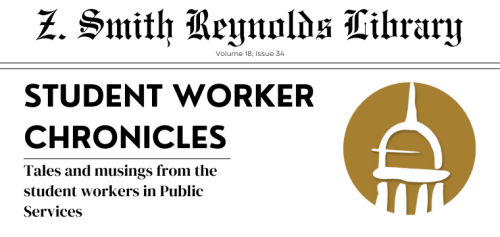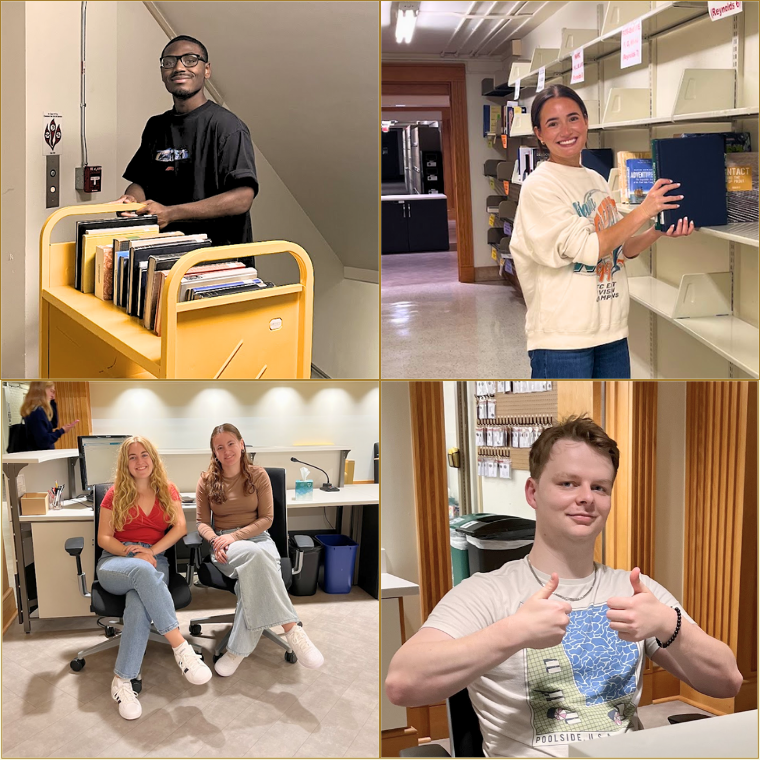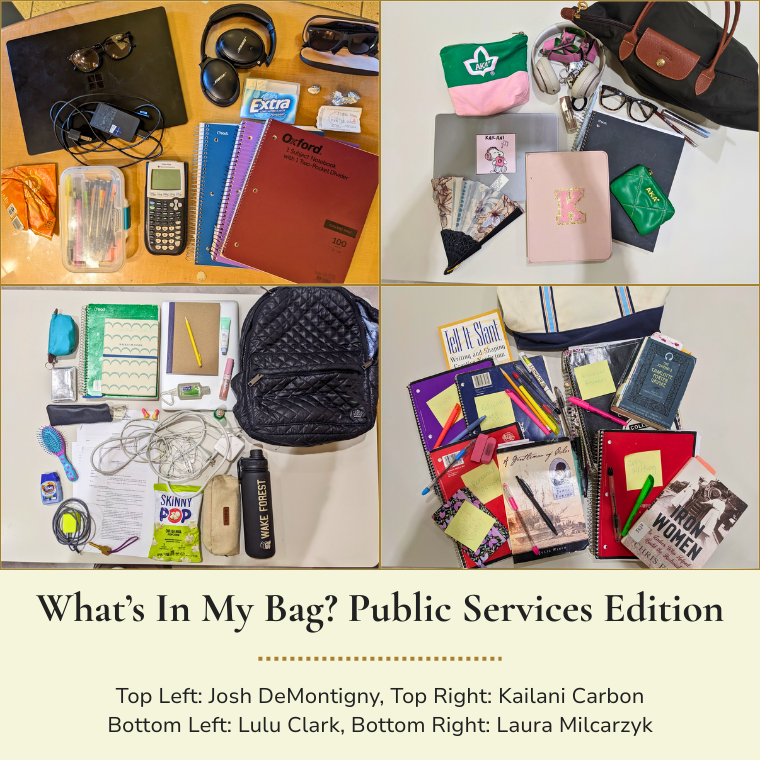
After a summer of construction and limited services, ZSR Library reopened to the public on August 18, 2025—just in time to welcome the WFU community back for the fall semester. The new floors and skylights bring more light into the Atrium, but nothing makes the building shine brighter than seeing our community return from our spot at the Public Services desk!
This month’s Student Worker Chronicles celebrates that spirit of return. We’ve included a few welcome-back photos from our student employees, shared our own twist on the social media favorite “What’s in Your Bag?”, and highlighted reflections from student workers on how their study abroad experiences have shaped their education and their lives.
Welcome Back Student Employees!

What’s in Your Bag?

From Their Perspective: 3 Seniors share their Study Abroad Experience from last Spring
Samantha Homick in London
This past Spring 2025 semester, I had the amazing opportunity to study abroad in the United Kingdom, London, and I will forever cherish the friends and memories made there.
I originally planned to study there because it filled the rest of my divisional requirements by providing classes like: English, History, Art, and Humanities. But as I looked more into the program, I became even more excited to live there for 4 months; I loved that it was a major city with plenty of things to do, people to meet, and experiences to have; and I also really liked how all of the classes were taught in the house we lived in, with other WFU students.
This study abroad was through an English program, which consisted of 2 English classes that were both taught by a WFU resident professor, while the remaining classes were taught by British professors. Although most of the students in the program were English majors, I really enjoyed the change of pace, coming from a Pre-Vet student who usually is taking STEM courses.
At the beginning of the Spring semester I didn’t plan too much. I more so went with the flow, making a “want-to-do” list throughout the 4 months, which I thought worked really well. I went on the London Eye (which is a ferris wheel that happens to be one of the most famous tourist attractions in the UK), did a Harry Potter walking tour, experienced a historical pub crawl, went into numerous museums in the city, and met so many strangers along the way!
I even got to travel throughout the weekends; I went to Bath, Stonehenge, France with my two roommates; Salamanca, Spain to visit my WFU friend in her study abroad program; Wales to see the wetland reserves; Vienna, Austria, as well as three cities in Italy: Venice, Florence, and Pisa. Although a little hectic, these trips were probably some of my favorite memories abroad. The best part of traveling throughout Europe was that all the flights were so cheap! You could go practically anywhere without spending more than $300.
Surprisingly, I think I adapted well in Europe, despite the fact that I never traveled outside the United States before this semester; I joined a few community groups, the main one being with the nearby Catholic church and made a lot of friends there, who made me feel really welcomed to the foreign country. I think meeting new people every chance I got helped me adapt quickly.
Walker Newman and Soany Aguilar in Salamanca, Spain
Seniors Walker, Newman and Soany Aguilar, both spent their study abroad in Salamanca, Spain. They decided to share their their differing experiences in this interview style format.
What was the purpose of your study broad?
Walker Newman: I went to Salamanca in Spain for the Spring of 2025. The neuro program in Salamanca is mainly for biology and neuroscience students, and there were opportunities to take classes for my biology major, but also to explore neuroscience more deeply at the Institute for Neuroscience in the city.
Soany Aguilar: I went to Salamanca, Spain. It was the perfect place for me to complete my Spanish minor and immerse myself in a Spanish-speaking country. My main goal was to improve my Spanish and learn more about the dialect in Salamanca. This Spanish immersion program also provided the opportunity of an internship, so I wanted to get more experience with Spanish in clinical settings.
How was the planning and trip experience? Any fun stories about travel?
Walker Newman: I loved my semester abroad. I got much more comfortable in my own skin, and pushed myself academically. I made great friends, and was able to travel around Europe a lot. Some of my favorite places that I visited were Porto, Copenhagen, Amsterdam, Madrid, and Prague. I enjoyed getting to see the different lifestyles in each region of Europe because they are so distinct.
What were your first impressions of Spain?
Walker Newman: Spain struck me as an incredibly social and laid back country and culture. The people were super friendly and patient with my horrible Spanish. Family and friends are very centered in Spanish culture, so you’d always find people walking around and chatting or sitting to eat in big groups on any day of the week.
Did you have any cultural shock?
Walker Newman: I did experience culture shock, but more with using a new language and one that I had only been exposed to for one semester prior to leaving. I had built skills in a prior study abroad experience to combat these challenges, for example figuring out more than one way to say a phrase in a foreign language, or using context clues to communicate.
Soany Aguilar: One culture shock I had was the difference in the daily pace of life in Spain. Overall, life moves a lot more slowly compared to the United States. There is a designated time, usually 2-5 pm, where everyone takes a “siesta” and almost all of the restaurants and stores are closed. At first, this was very inconvenient to me, but I then learned to take my rest as well.
Another difference is in meal times and sizes. Breakfast is typically something small and coffee. Not once did I have eggs, bacon, or pancakes for breakfast, unless there was a continental breakfast on trips. Lunch was at 2 pm and was very large. The thing that surprised me the most was that dinner was usually at 9 or 10 pm. This was a big stretch from lunch, and it took me a while to get used to it without being hungry all day.
Another difference was in the way that I interacted with the Spanish people. They are a lot more direct and expressive, never sugarcoating anything, which at first came off as rude. I got used to all of these changes throughout my study abroad and still had a wonderful time.
Where did you stay?
Walker Newman: I lived in a dorm close to the city center with 7 other Wake Forest students participating in the neuroscience program as well as University of Salamanca students.
Soany Aguilar: I stayed with a host family, consisting of a mother and her 18-year-old daughter. It was nice to have someone around my age in the home, as she gave me lots of advice for social life and the best spots in Salamanca. My host mother also had other host kids coming in and out, some staying for just a week, while others stayed a month or two. One other student stayed the whole time throughout my study abroad. It was super cool to live with so many different students, coming from different places around the world, like Canada, Ireland, France, Italy, Germany, and the United States. I formed some of the best friendships, and I still talk to these girls.
Do you have a favorite memory?
Walker Newman: I can’t place just one favorite memory, but I really loved the trips that were built into the neuro program. We had three separate week-long trips around the different regions of Spain as a group, exploring cultural and scientific sites. The days were long, but I got so much closer with the other members of my group on these trips and I learned so much.
Soany Aguilar: My favorite memory is Lunes de Aguas, where everyone gathered around el puente romano, sharing food and drinks, and playing games. It was nice to be around all of my friends, enjoying the warm weather and having fun. It was almost like a festival, and everyone ate hornazo, a traditional dish for lunes de aguas. The bridge was also where you could look out onto the city of Salamanca and see the cathedral. It was my favorite time in Salamanca.
Any favorite foods and/or drinks?
Walker Newman: The food in Spain is notorious for being good, and it lived up to expectations. My favorite on the go food was patatas bravas, which are fried potatoes with a ketchupy sauce and an aioli.
Soany Aguilar: The food was very different, but good. One thing I did not enjoy as much was that there was no spicy food. In some restaurants, they had foods labeled as spicy, but they were nowhere near comparable to the spicy foods that you can find in the United States. I did enjoy that almost all of my meals had a combination of vegetables, proteins, and carbohydrates. Dessert was typically a yogurt or fruit, with ice cream being every once in a while. I think I ate a lot healthier while I was there, but I still enjoyed the food. My favorite drink was Fanta limón, as we do not have it here. I also really enjoyed the tortilla de patata, which is very different from the tortillas we have in the United States.
Final thoughts?
Walker Newman: Studying abroad was my favorite time at Wake so far, and it made me grow and confront my insecurities head on. I took challenging classes in another country and succeeded, proving to myself that I am capable of undertaking educational difficulties. I figured out how to travel around Europe, budgeting my time and money to be able to see historical sites and interact with people from across the world.
Soany Aguilar: My time abroad definitely added to my career and college experience. I am now able to speak and write Spanish exponentially better, and even gained experience translating and interpreting in a clinical setting. I can understand the Spanish dialect better and have learned to be more culturally aware. These are skills that I will for sure be using in my future career, and they give me more tools to make healthcare available for disadvantaged Spanish speakers.
1 Comment on ‘Public Service Student Workers’ Chronicles’
What a wonderful experience these students had in their study abroad! I really enjoyed reading this, and also loved the What’s in your bag? section. Thank you for sharing!